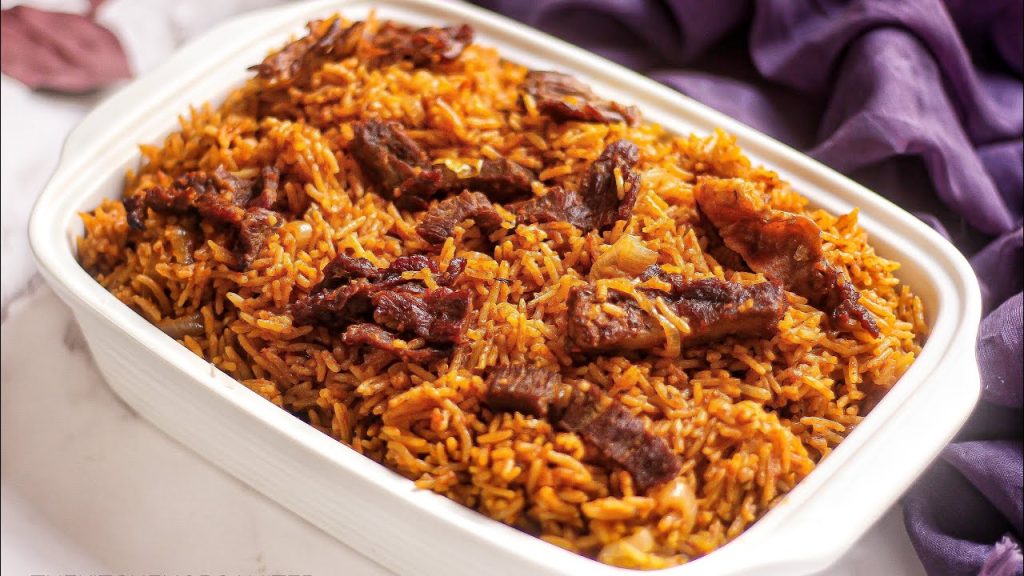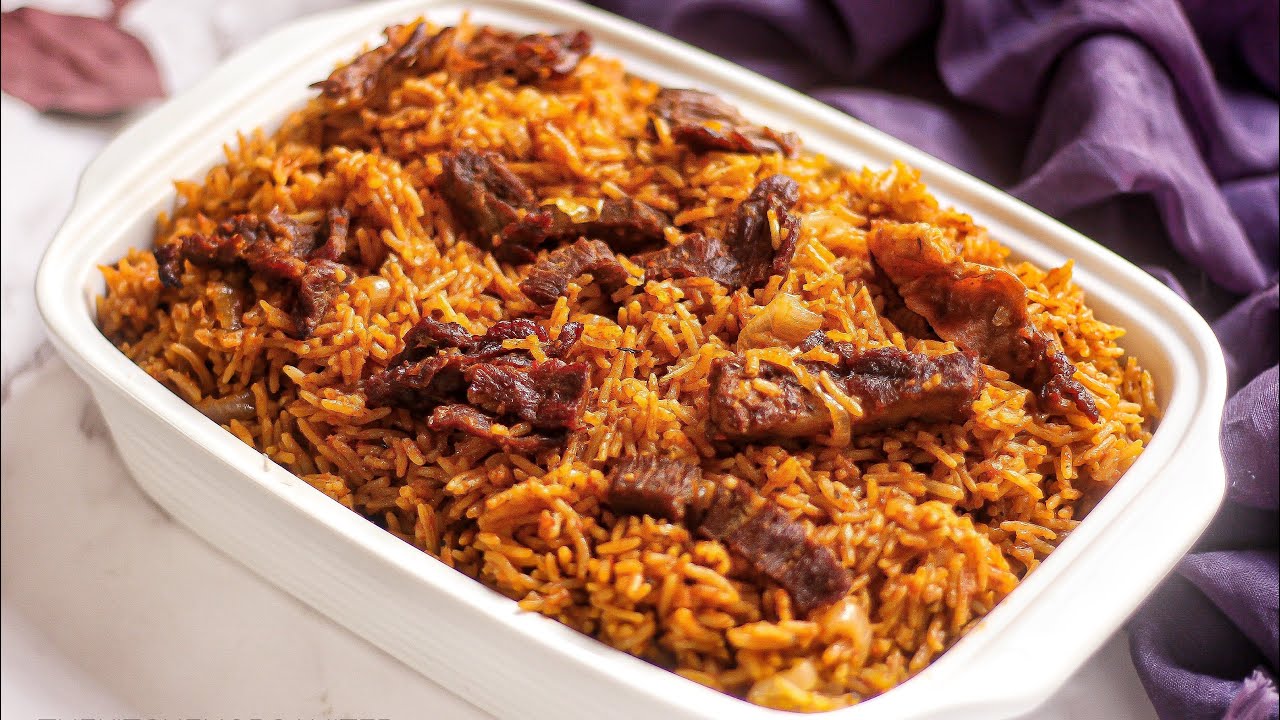
Nigeria is more than just its bustling cities, breathtaking landscapes, and colorful culture—it’s a culinary wonderland waiting to be savored. With over 250 ethnic groups and a history rich in trade, migration, and tradition, Nigeria offers a diverse and delicious array of food experiences that will leave your taste buds tingling and your heart full.
Whether you’re a first-time visitor or a seasoned foodie, Nigeria’s cuisine offers something special for everyone. From smoky plates of Jollof rice to sizzling skewers of Suya, and hearty bowls of Egusi soup, the food here is not just sustenance—it’s a celebration of life, love, and culture.
Let’s take you on a virtual culinary tour across Nigeria—one that you can truly experience in person with our guided travel services!
1. The Legendary Jollof Rice
No culinary conversation about West Africa is complete without the mention of Jollof rice. While the debate over which country makes the best Jollof—Nigeria or Ghana—continues to rage on social media, one thing is undeniable: Nigerian Jollof is bold, spicy, and deeply satisfying.
Cooked in a rich tomato and pepper base, and often enhanced with onions, seasoning cubes, bay leaves, and Scotch bonnet peppers, Nigerian Jollof is typically paired with fried plantains, grilled chicken or beef, and a chilled drink.
No party in Nigeria is complete without it—Jollof rice is the heartbeat of celebrations. For the full experience, enjoy it at a local buka (eatery), or at a family-style restaurant with a view of the Lagos Lagoon.
Travel Tip: Ensure your Jollof is prepared in a hygienic kitchen—look out for clean, reputable establishments or ask your local guide for recommendations.
2. Suya: The Street Food King
Next on your plate is Suya—a spicy, smoky street delicacy made from skewered beef, ram, or chicken. Originating from the Northern Hausa people of Nigeria, Suya is marinated in a blend of ground peanuts, cayenne pepper, salt, and traditional seasonings, then grilled to perfection.
Served with slices of onions, fresh tomatoes, and spicy pepper mix, Suya is best enjoyed under the stars at night markets or roadside grills.
For the best Suya experience, head to popular spots like Yahuza Suya Spot in Abuja or University of Suya in Lagos.
Travel Tip: Don’t forget to ask for “low pepper” if you’re not used to spicy food!
3. Pounded Yam and Egusi Soup: Comfort in a Bowl
If you want to experience the richness of Nigerian home-cooked meals, then pounded yam and Egusi soup is a must-try. Pounded yam, with its stretchy, dough-like texture, is made by boiling yam and pounding it until smooth. It’s best eaten with the fingers—form a small ball, dip it into the soup, and savor.
Egusi soup is made from ground melon seeds, leafy greens, assorted meats, and spices. It’s hearty, flavorful, and a favorite across many Nigerian tribes.
Culinary Culture Tip: Many traditional Nigerian dishes are eaten without cutlery. Embrace the local style—it’s part of the experience!
4. Akara and Moi Moi: Flavors of the Morning
If you’re up early and looking for a quick bite, try Akara—deep-fried bean cakes with a crispy outer layer and soft, fluffy interior. Often sold by street vendors, Akara is best enjoyed with pap (a cornmeal pudding) or bread.
For a more filling option, try Moi Moi, a savory steamed bean pudding made with pureed beans, peppers, onions, and sometimes fish or egg.
Both dishes are rich in protein and beloved across the country.
Travel Tip: Try Akara at a local breakfast spot, and make sure it’s made fresh. Hygiene matters, especially for street food!
5. Seafood by the Coast
Nigeria’s coastal cities, especially Lagos, Port Harcourt, and Calabar, are havens for fresh seafood lovers. From peppered crabs to grilled fish and prawn stew, the flavors here are spicy, rich, and unforgettable.
Head to Tarkwa Bay Beach or the Elegushi seafront in Lagos for fresh catches served hot and spicy with a cold drink on the side. Don’t miss Fisherman soup, a spicy broth from the Niger Delta that’s loaded with fresh seafood and herbs.
Pro Tip: Ask for freshly prepared dishes and be sure to dine in restaurants that uphold high sanitary standards.
6. Boli and Groundnut: The Perfect Snack
Simple yet satisfying, Boli is roasted plantain, often sold on the roadside and served with spicy pepper sauce or groundnuts (peanuts). A favorite among commuters and locals, it’s a snack that perfectly represents Nigerian ingenuity—humble ingredients with bold flavor.
Cultural Note: It’s best enjoyed during Lagos’ evening rush hour or while watching a football match with locals.
7. Palm Wine and Zobo: Sip Like a Local
What’s food without a good drink? In Nigeria, you’re spoilt for choice.
Palm wine, a naturally fermented sap from palm trees, is sweet and mildly alcoholic. It’s often served at traditional gatherings and has deep cultural significance.
For a non-alcoholic option, try Zobo, made from hibiscus petals and infused with ginger, pineapple, or citrus. It’s refreshing, tangy, and full of antioxidants.
Tip: Ask your guide for trusted local spots where these drinks are freshly prepared.
8. Cultural Food Festivals and Buka Experiences
To truly dive into Nigeria’s culinary culture, consider attending food festivals like the GTBank Food and Drink Festival or the Lagos Food Fest. Here, you’ll enjoy live cooking demonstrations, music, and a wide array of dishes from different tribes.
Also, don’t miss out on the buka experience—local eateries known for authentic, no-frills Nigerian cooking. It’s here you’ll find dishes like Ogbono soup, Okra, Afang, and Oha—all regional specialties that reflect Nigeria’s rich culinary tapestry.
9. Cook and Learn: Take a Local Food Class
Why not take a piece of Nigeria back with you—by learning to cook your favorite dish? Many culinary centers and hotels now offer food classes where visitors can learn how to make Jollof rice, Egusi soup, or Akara with help from local chefs.
You’ll not only enjoy the meal you prepare but also gain a deeper appreciation for the technique, ingredients, and cultural significance of each dish.
10. Don’t Just Eat—Experience the Culture
In Nigeria, food is much more than what’s on your plate—it’s a gateway to culture. Each region brings its own spices, cooking methods, and flavor profiles. From the Yoruba people’s love for spicy stews, to the Igbo’s rich soups and the Hausa’s grilled meat traditions, every meal tells a story.
Understanding Nigerian food is understanding Nigeria itself—diverse, dynamic, and deeply rooted in tradition.
Travel Confidently with Us
To truly enjoy Nigeria’s culinary treasures, you need more than just a list of restaurants—you need local insights, seamless logistics, and a taste of genuine hospitality. That’s where we come in.
When you book a guided culinary tour with us, we provide everything you need:
- Airport pick-up and drop-off
- Air-conditioned transportation throughout your stay
- Curated food experiences with trusted and hygienic vendors
- Top hotel accommodations
- Visits to key attractions and popular foodie destinations
- 24/7 security and logistics support
- Friendly, knowledgeable tour guides at your service
Whether you’re tasting Jollof at a wedding, trying Suya under the stars, or learning how to cook Egusi soup, we make your Nigerian food journey safe, exciting, and unforgettable.
Come Hungry, Leave Fulfilled
From Jollof to Suya and everything in between, Nigeria is a culinary paradise waiting to be explored. It’s a place where meals turn into memories, and every bite is an invitation to dance to the rhythm of culture, spice, and warmth.
So, pack your appetite and your sense of adventure.
Let Nigeria feed your soul. Let us guide your journey.







